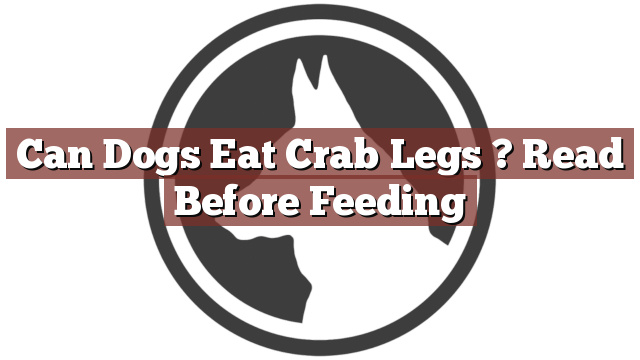Understanding Your Dog’s Dietary Needs
As a responsible pet owner, it is important to understand your dog’s dietary needs in order to provide them with a healthy and balanced diet. While dogs are primarily carnivorous, their bodies are also capable of digesting certain plant-based foods. However, it is crucial to remember that not all human foods are safe for dogs to consume. Before introducing any new food into your dog’s diet, it is essential to do proper research and consult with your veterinarian to ensure it is safe and beneficial for your furry friend.
Can Dogs Eat Crab Legs? Read Before Feeding
Can dogs eat crab legs? This is a question that many dog owners may have when considering sharing their seafood delicacies with their four-legged companions. The short answer is no. While crab meat itself can provide some health benefits to dogs, crab legs are not recommended for several reasons.
Firstly, crab legs are primarily made up of hard shells, which can pose a choking hazard or cause internal injuries to dogs if not properly chewed. Additionally, the shells can be quite sharp and can cause damage or irritation to the mouth, throat, or digestive tract. Moreover, crab legs are often cooked with spices, butter, or other seasonings that can be harmful to dogs. These ingredients may cause digestive upset, allergic reactions, or even toxicity in some cases. Therefore, it is best to avoid feeding crab legs to your furry companion.
Pros and Cons of Feeding Crab Legs to Dogs
While crab legs are not recommended, it is important to understand the potential pros and cons of feeding crab meat to dogs. Crab meat is a good source of protein and contains essential vitamins and minerals such as vitamin B12, zinc, and omega-3 fatty acids. These nutrients can support your dog’s overall health and well-being. However, it is crucial to ensure that the crab meat is properly cooked, free from any seasonings or additives, and served in moderation. Overfeeding crab meat or any other food can lead to obesity, digestive issues, or nutrient imbalances.
Conclusion: Considerations for Feeding Crab Legs to Your Dog
In conclusion, it is best to avoid feeding crab legs to your dog due to the potential risks associated with their hard shells, seasonings, and potential choking hazards. While crab meat itself can offer some nutritional benefits, it is important to serve it in moderation and without any added spices or seasonings. If you are unsure about whether a specific food is safe for your dog to consume, always consult with your veterinarian before introducing it into their diet. Remember, the health and well-being of your furry friend should always be your top priority.
Thank you for taking the time to read through our exploration of [page_title]. As every dog lover knows, our furry friends have unique dietary needs and responses, often varying from one canine to another. This is why it's paramount to approach any changes in their diet with caution and knowledge.
Before introducing any new treats or making alterations to your dog's diet based on our insights, it's crucial to consult with a veterinarian about [page_title]. Their expertise ensures that the choices you make are well-suited to your particular pet's health and well-being.
Even seemingly harmless foods can sometimes lead to allergic reactions or digestive issues, which is why monitoring your dog after introducing any new food item is essential.
The content provided here on [page_title] is crafted with care, thorough research, and a genuine love for dogs. Nevertheless, it serves as a general guideline and should not be considered a substitute for professional veterinary advice.
Always prioritize the expert insights of your veterinarian, and remember that the health and happiness of your furry companion come first.
May your journey with your pet continue to be filled with joy, love, and safe culinary adventures. Happy reading, and even happier snacking for your canine friend!

